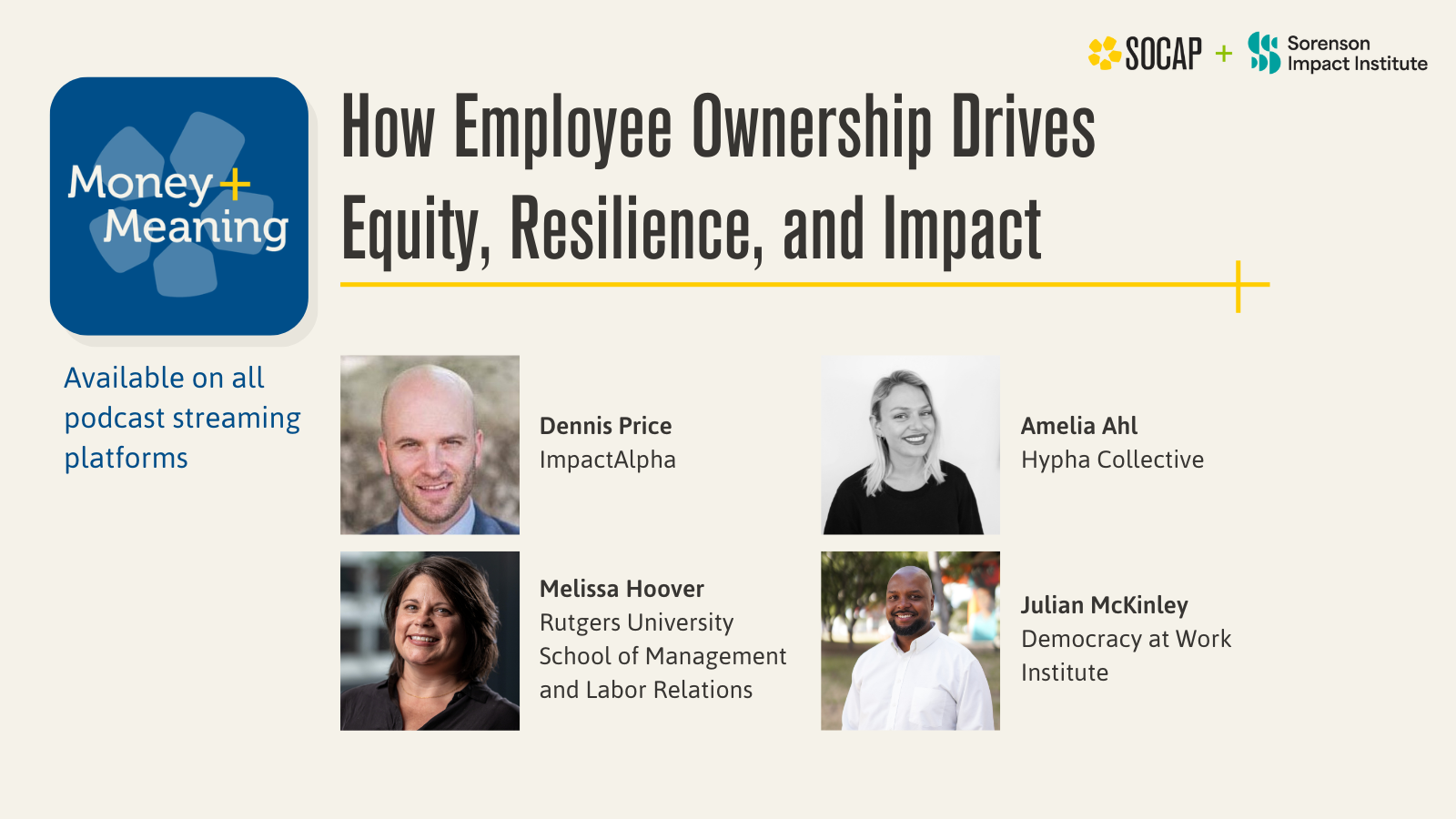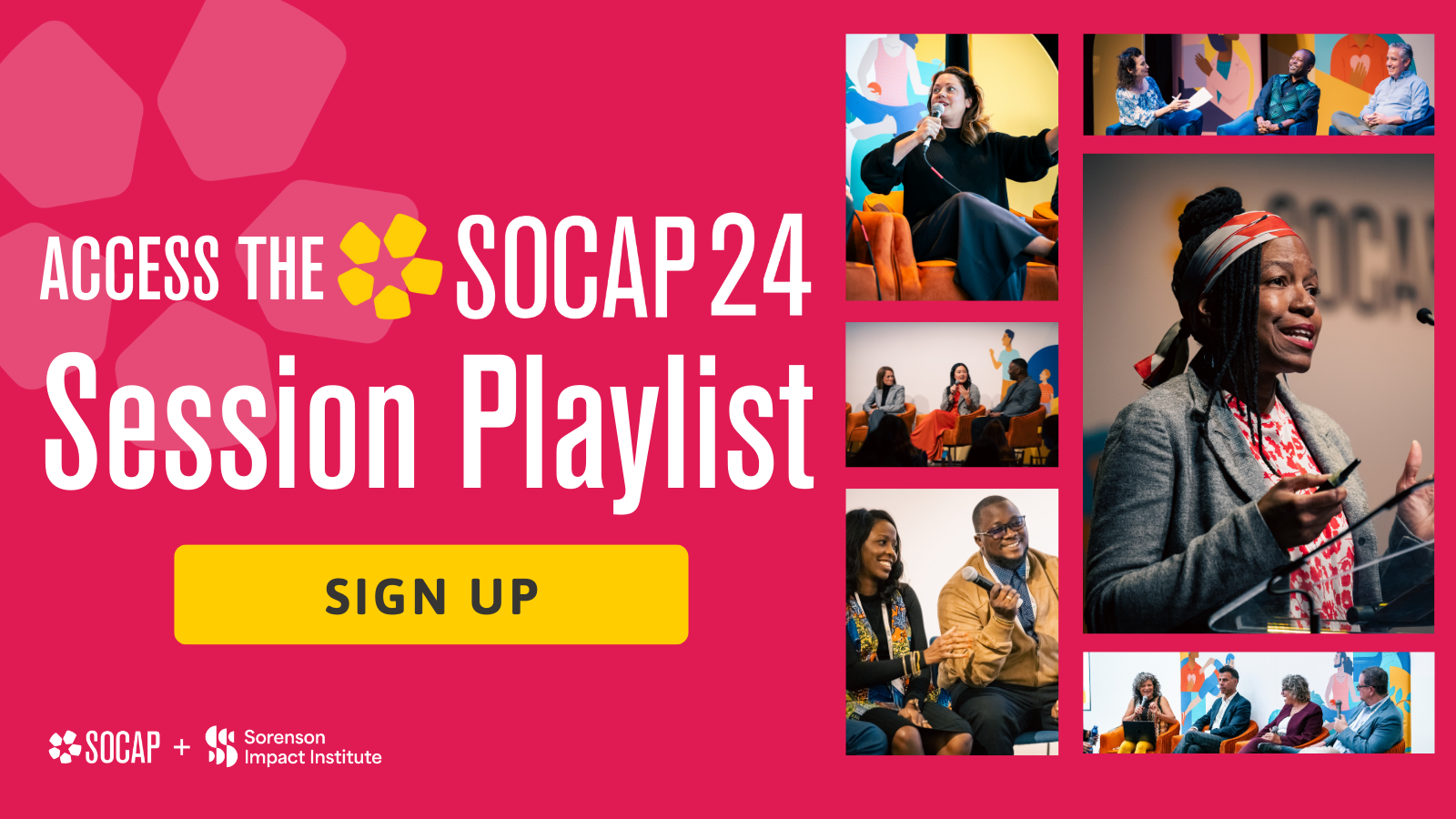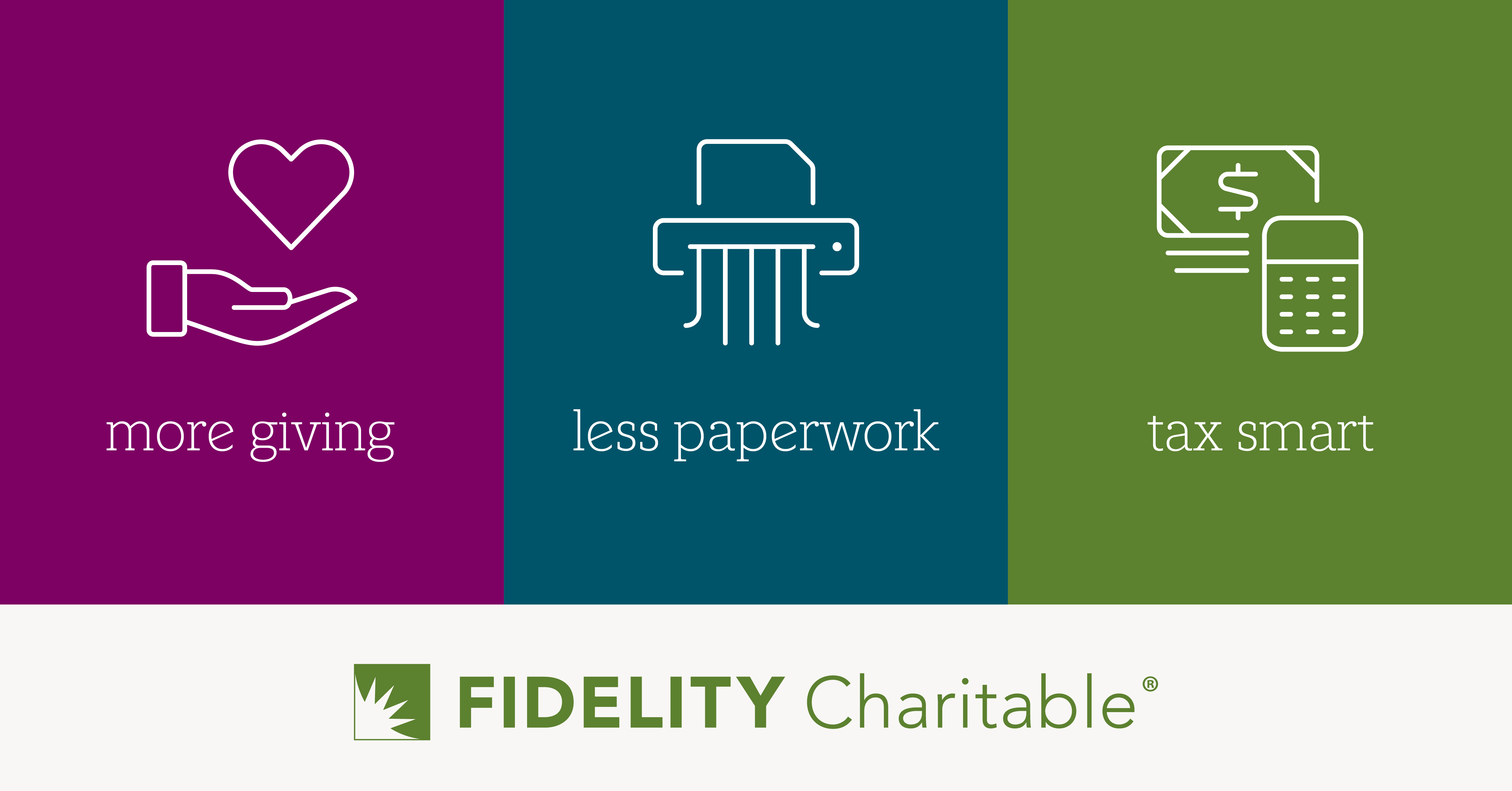A Money + Meaning Podcast with Julian McKinley of the Democracy at Work Institute, Melissa Hoover of Rutgers University School of Management and Labor Relations, Amelia Ahl of Hypha Collective, and Dennis Price of ImpactAlpha
Employee ownership models offer a multi-pronged economic opportunity that can create greater financial benefits for workers, impact-minded investors, and businesses. While the shift to an employee ownership culture requires patient capital, technical assistance, and other support, it holds long-term promise for the lives of employees and their families, their communities, and businesses’ bottom lines.
The potential that shared business ownership holds to benefit stakeholders and drive systems change is the focus of a new Money + Meaning episode featuring a SOCAP24 conversation with experts in the field. They explore the role that investors can play in supporting employee ownership models and how shared ownership helps build more resilient, equitable, and profitable businesses. The conversation featured:
- Julian McKinley, Co-Executive Director of the Democracy at Work Institute
- Melissa Hoover, Senior Fellow at Rutgers University School of Management and Labor Relations
- Amelia Ahl, Co-Founder of Hypha Collective
- Moderator Dennis Price, Co-President of Impact Alpha
Price launched the conversation by noting the emergence of employee ownership as a viable impact investing strategy to address wealth inequality, build resilient communities, and drive long-term business value creation. “But what does an ownership culture look like? How can it unlock business value, as well as benefits for employees and communities? And what role can investors play?”
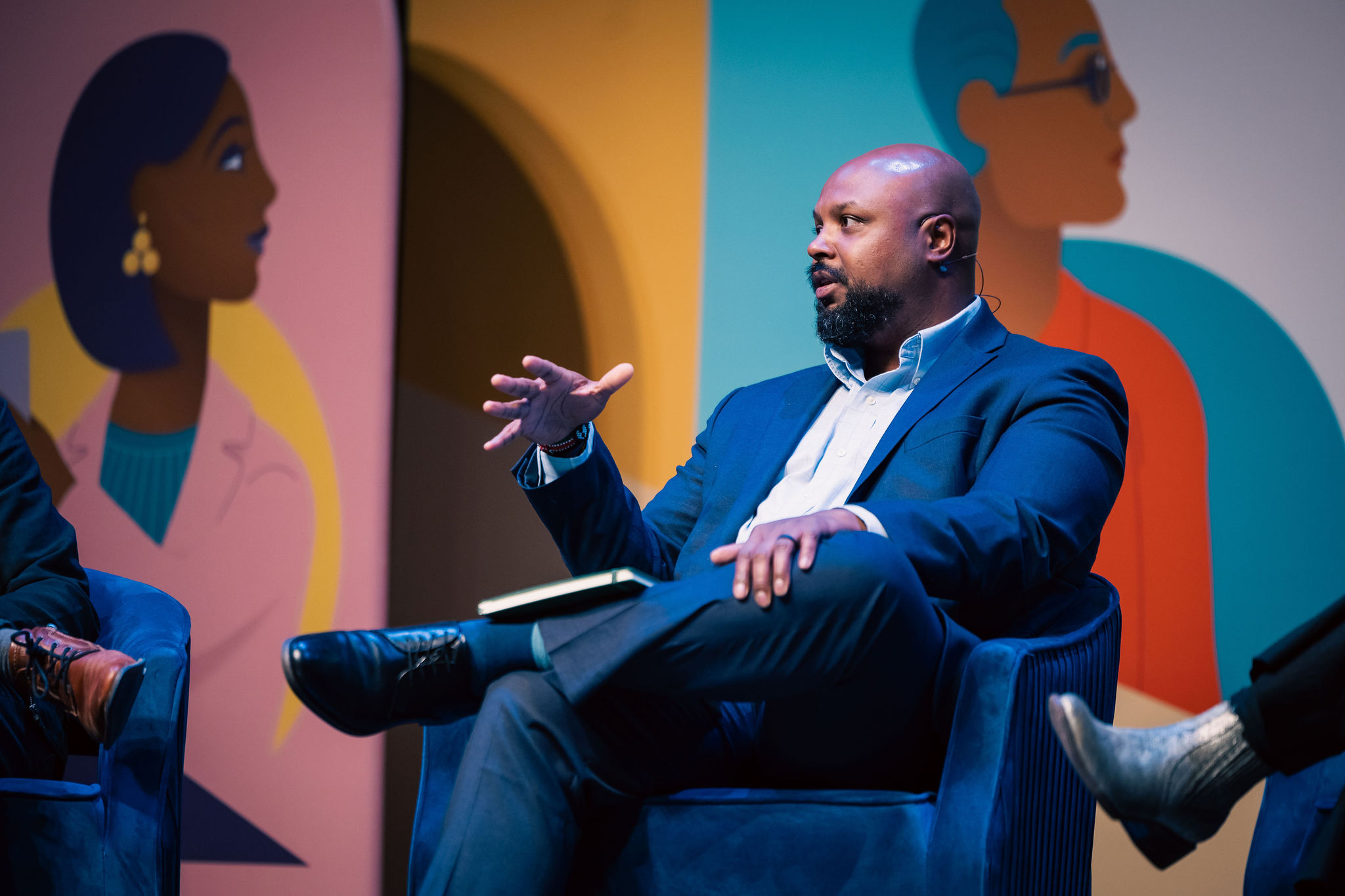
McKinley said that employee ownership models span a spectrum, from profit-sharing to broad-based Employee Stock Ownership Plans (ESOPs) to democratic business ownership through worker cooperatives. He said the Democracy at Work Institute primarily works with businesses that establish profit-sharing and an ownership culture, where employees feel that they have a voice in decision-making and see how they financially benefit from the company’s success. “It’s an important distinction because there is really an inherent misalignment between labor and enterprise in terms of what their goals are,” he said. “Frontline workers are most familiar with their tasks and ways to be more efficient. Ownership culture lets them identify those and be a part of the financial benefit of greater efficiency.”
The ownership culture elements of profit-sharing and participation also resonate with impact investors who want to put their capital to work for long-term social change, McKinley said. “Over the past five years in particular a quarter of the funds that are investing in employee ownership were started. So there’s a moment in time where these funds are coming together, they’re launching, they’re investing in employee ownership,” he said.
Shifting to employee ownership models also is a timely opportunity for baby boomers who own businesses and are seeking exit options that can make a positive difference, McKinley said. The COVID-19 pandemic and subsequent economic impacts took a toll on many companies, especially Black-owned businesses that saw a 40% drop. “Putting the value of a thriving business in the hands of working families can really be transformative,” he said. “Ownership culture can unlock those other pieces, such as reducing the racial wealth gap and creating health impacts.”
Prioritizing Transparency to Drive Value and Help Build Employee Wealth
Hoover was part of the team that established the nonprofit Democracy at Work Institute to support a growing number of people using employee ownership models to enter the mainstream economy. As a researcher with decades of work in the field, she saw a need for financial and technical assistance to support and scale shared ownership. “Democracy at Work does ownership culture work within companies that drives value and mitigates risk for the investors,” Hoover said.
That includes establishing equity-based programs and practices to develop human-centered systems and engage employees. “Very often, the owner has not invested in systems of transparency, in HR, in the sort of human-centered advancement pathways for employees,” Hoover said. “The shift in mindset for us is to see workers as the beneficiaries and owners of the business, but also as real value drivers, and so to give them pathways to contribute to that value.”
Models like ESOPs can help workers build wealth for retirement or other purposes, she said. As employees gain shares of the company and receive dividends over time, those accounts can grow to six figures. “If we can make a dent in people’s everyday lives in addition to their retirement account, I think we’re good,” Hoover said.
At Hypha Collective, Ahl conducts and collects research to document and understand the holistic benefits of employee ownership practices and models. Companies with these models are generally more resilient and profitable and boast higher levels of employee satisfaction, retention, and job quality.
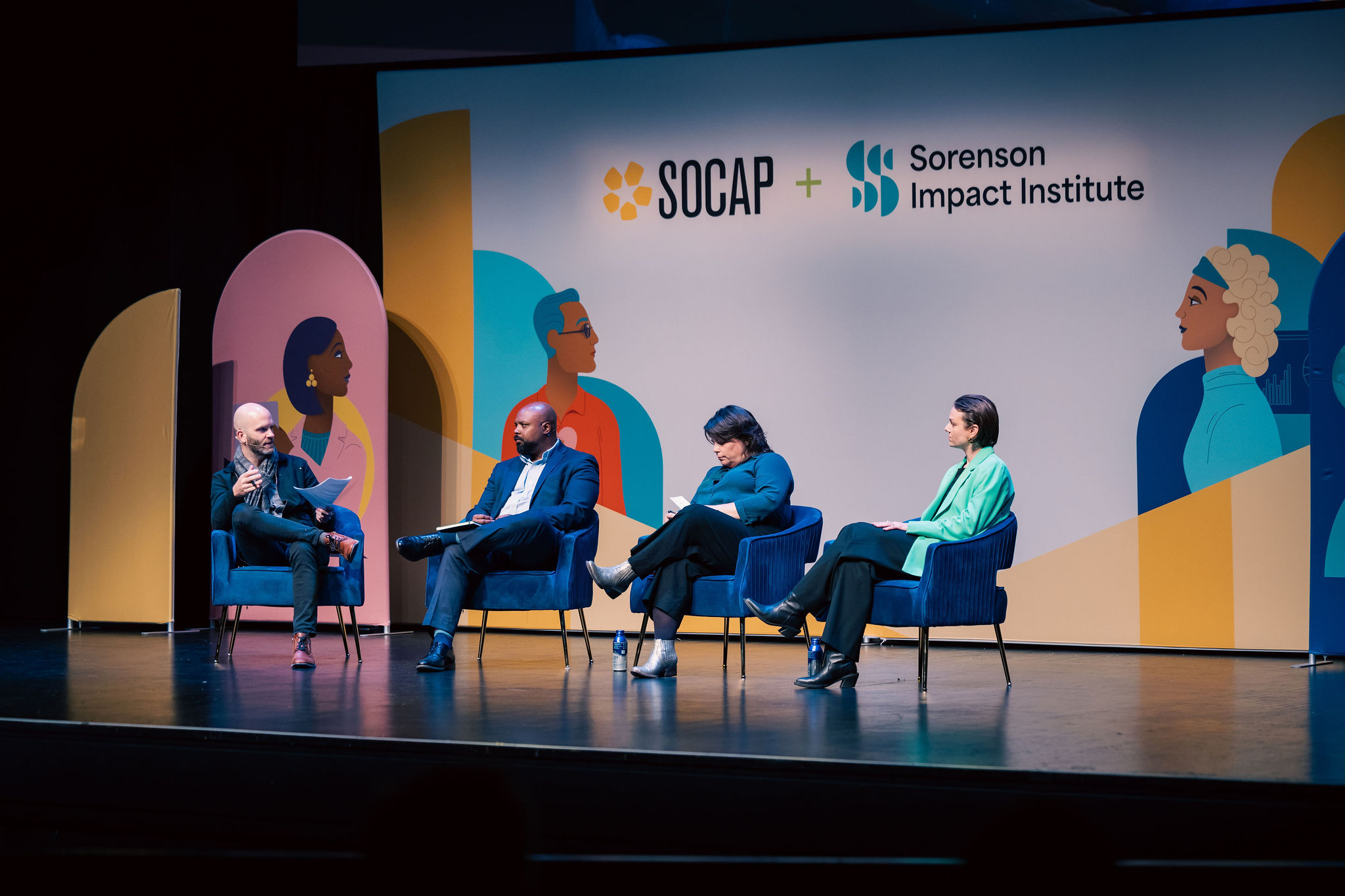
Those benefits also extend to communities, as worker-owned enterprises tend to weather tough times. One study found that worker-owners were more likely to vote in elections — a potential effect of being part of a democratic work system. “Folks who are in active worker-owned enterprises who are participating in democratic management processes, they’re kind of really living that process,” she said. “They’re living those values and embodying democracy.”
For investors and others in the impact community, employee ownership culture aligns with an emphasis on long-term outcomes over short-term outputs, Ahl said. “This reflects the material change in people’s lives,” she said. “You can’t have an ownership culture without transparency, feedback loops, and information-sharing. Those are core pieces to effective impact measurement for investors.”
Listen to the full conversation to hear more about these and other topics, including:
- What’s involved in the conversion to employee ownership and how companies can determine whether it’s a good fit.
- What technical assistance is available for companies considering employee ownership models.
- What practices nurture a successful ownership culture.
Don’t miss out! Subscribe to Money + Meaning on Apple Podcasts, Stitcher, TuneIn, Spotify, or anywhere else you find podcasts.
